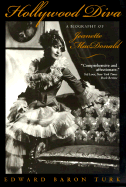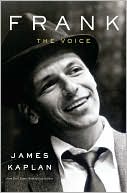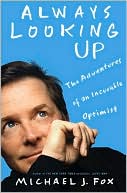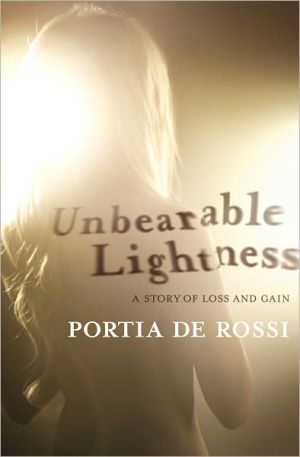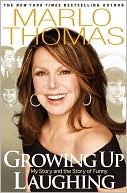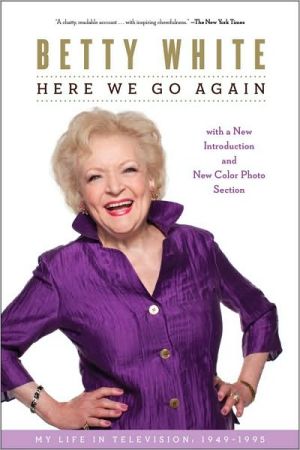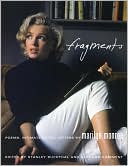Hollywood Diva: A Biography of Jeanette MacDonald
Based in large part on the author's exclusive access to MacDonald's private papers, including her unpublished memoir, this biography transports us to a time when lavish musical films were major cultural events and a worldwide public eagerly awaited each new chance to fall under the singer's spell. Edward Baron Turk shows how MacDonald brilliantly earned her Hollywood nickname of "Iron Butterfly" and why she deserves a privileged position in the history of music and motion pictures....
Search in google:
"Anyone who cares about the Hollywood musical—or about diva iconography—will welcome this scrupulous biography."—Wayne Koestenbaum, author of The Queen's Throat Ted Loos ...Turk's passion for the material is contagious....[he] contends that MacDonald "provided a first and defining encounter with the pleasures of classical music" for many Americans....[a] comprehensive and affectionate book. -- The New York Times Book Review
Hollywood Diva\ A Biography of Jeanette MacDonald \ \ By Edward Baron Turk \ University of California Press\ Copyright © 2000 Edward Baron Turk\ All right reserved.\ ISBN: 9780520222533 \ \ \ Chapter One—\ "Now Everybody's Got to Clap!" \ Jeanette comes from Philadelphia, but her voice has nothing in common with the Liberty Bell. She can hold a high C for fifty-five seconds without cracking!\ Cecil B, DeMille, Lux Radio Theatre, 1937\ She excelled in stunning entrances, and her birth was no exception.\ Jeanette MacDonald loved to recall her mother's story of how she wriggled into the world from the upstairs quarters of the family's row house in West Philadelphia: "She used to say she should have known better than to go into the bathroom after the deep labor pains began. When it happened, Father was racing to the corner drugstore to telephone the doctor." The physician, it turned out, was on another call. Frantic, Daniel MacDonald sped home. He bolted into the kitchen, scrubbed his hands and forearms, and filled the kettles on the iron stove. Next he flew up the staircase to comfort his wife, who by then had crawled back to their bedroom and lay on the floor, howling with pain. It was Daniel, not the doctor, who delivered the infant. In the years that followed, Daniel often teased his youngest daughter about her debut: "You always were impatient, Jeanette. Youcouldn't even wait until the doctor arrived!"\ June 18, 1903, may well have been the last time Jeanette MacDonald was early for anything. She grew up to become a chronic insomniac and allergy sufferer, exasperating directors and costars with her pointblank refusal to do early-morning shoots. Yet no one would remainangry for long. It was impossible to stay mad at this "fabulous creature," as the writer Anita Loos dubbed her. Even as a child, Jeanette had charm and wit in spades, making most people, men especially, feel relaxed and vibrant in her presence.\ The third week in June 1903 was unseasonably cool for the City of Brotherly Love. But a restless populace blithely ignored the lag in temperature. Crowds jammed Independence Hall to welcome home the Liberty Bell, recently loaned to Boston. Citizens flocked to Valley Forge to commemorate Evacuation Day. A new holiday, Flag Day, fueled the patriotic spirit as people awoke on June 14 to find Old Glory flying everywhere. Ethnic separation was also starkly evident. White Protestant males chanted "Hail, Pennsylvania" at the University of Pennsylvania's 147th commencement exercises. Fireworks and a parade greeted the Junger Mdnnerchor, a German-American singing society that had just returned triumphantly from vocal combat in Baltimore. Near Columbus Hall, on South Eighth Street, Italian immigrants launched their annual street festival in homage to San Nicandra. Mother Jones, the redoubtable Irish-born labor organizer, led hundreds of textile workers in a fiery demonstration at City Hall Plaza. Clara Barton, the founder of the American Red Cross, rallied new graduates of the Philadelphia School for Nurses to care for black and immigrant children in the city's northern slum wards.\ The Philadelphia Orchestra, created in 1900 by millionaire patricians for other wealthy Main-Liners, also concerned itself with bettering the masses. Fritz Scheel, the orchestra's first conductor, was a German autocrat who staunchly resisted pressure from subscribers to add cozy Viennese waltzes to his symphonic programs. Yet Scheel recognized the social need to provide American youth and factory workers with concerts at nominal fees. When Leopold Stokowski began his legendary tenure as conductor in 1912, he massively built on Scheel's initiatives. Even Philadelphians who had never been to a concert proudly embraced the charismatic Stokowski and his orchestra as the city's most prominent ambassadors since Ben Franklin.\ For music lovers that third week of June 1903, the chief attraction was Victor Herbert and his orchestra under the stars at Willow Grove Park on Thursday. Ordinarily, the family living at 5123 Arch Street would have packed a picnic supper and taken the special excursion train northward to hear the famous composer, who was scheduled to perform selections from his newest success, the operetta Babes in Toy -\ \ \ \ land . But the MacDonalds were otherwise engaged. They were attending to the early arrival of the baby girl who, as fate had it, would grow up to be the best-known exponent of Victor Herbert's melodies from Naughty Marietta and Sweethearts , American operetta classics the maestro had yet to compose.\ Jeanette's father cut a refined, almost dandyish figure. He had elongated hands, closely cropped reddish gold hair, and high cheekbones on an oval face whose green eyes glittered under hooded lids. A strong, wide chin and an impeccably trimmed mustache gracefully offset his long, straight nose. Daniel's broad and generous smile exposed a set of naturally perfect teeth. Though all three of Daniel's daughters inherited some of his coloring and features, the new baby was the spitting image of her father.\ A staunch Republican, Daniel had supported William McKinley for president, and he revered Teddy Roosevelt, who was residing in the White House at the time of Jeanette's birth. But Daniel never quite met his own ambitions. As a child, he aspired to become a physician. His carpenter father, however, lacked the means to put any of his five children beyond grammar school. Jeanette recalled how Daniel sometimes sprouted a Vandyke beard, which to her eyes made him look "very distinguished," like pictures she had seen of Czar Nicholas of Russia. For Daniel, the makeover provided the slender ego boost of being addressed by the family, even if only in jest, as "Dr. MacDonald."\ As an adult, Jeanette occasionally told people that her father had been "one of Philadelphia's leading contractors." The reality was less grand. Daniel was a decent and reliable salesman for Mantels & Co., a small factory that made windowsills, door frames, and mantelpieces. By 1910, Philadelphia had nearly a hundred manufacturers of lumber and timber products, producing an output valued at over $7 million. But Daniel's company never fully recovered from the national recession of 1907, and when Jeanette was six, Daniel found himself laid off. "We had our share of ups and downs," she reminisced. "In those days, I doubt whether Father ever made more than $20 a week. When he got a $5 raise, we celebrated by having electric lights installed to replace the gas. Father was forever sitting down at the kitchen table with Mother to work out a new budget—so much for food, for coal, for new clothes and visits to the doctor—wondering whether he could afford to buy a whole ton of coal at a time, which was cheaper in the long run."\ Jeanette eventually learned that Daniel had "silently prayed for astrapping son" throughout his wife's third pregnancy: "Father walked around with a perpetual grin, as if he'd had some 'advance word' the third time was definitely going to be his lucky charm." When the event proved otherwise, Daniel determined that, lacking a son, he would encourage his daughters, especially the youngest, to pursue the American dream that was eluding him. Jeanette quickly became her father's favorite. Yet she never shook the feeling that she let him down by being born a girl. Years later, MacDonald referred to her impromptu birth as "Father's final feminine disappointment."\ Daniel's social status had improved somewhat over the years. When his first daughter, Elsie, was born in 1893, he was working in the Philadelphia mills as a weaver. At that time, the family lived in cramped downtown quarters on Brandywine Street, a few blocks east of the Schuylkill River. Two years later, with the arrival of Edith, quickly nicknamed Blossom, the household moved to a larger space across the river, at 3313 Wallace Street in West Philadelphia, but still, as Blossom bluntly put it, "near the railroad tracks." Seven months before Jeanette's birth, in November 1902, Daniel purchased the four-bedroom house at 5123 Arch Street, where his third child would be born and raised.\ West Philadelphia had become a part of the Quaker City as a result of the 1854 Act of Consolidation. The area grew rapidly during the next half century, partly because of the University of Pennsylvania's relocation from Ninth and Chestnut Streets to its imposing new site on Woodland Avenue, partly because of the exodus of upwardly mobile, white Protestant families away from the increasingly immigrant and black neighborhoods. Compared with central Philadelphia, West Philadelphia's streets were broader and sunnier, and much of this sprawling expanse took on a certain cachet for its well-to-do inhabitants.\ The MacDonalds' new home was in the forty-fourth ward, a distinctly lower-middle-class neighborhood a quarter mile west of the gardens protecting the world-renowned Pennsylvania Hospital for the Insane. The dwelling was one of a block-long row of tidy, identically constructed two-story houses. Each had seven rooms, hardwood floors, and a tiled bathroom; each had an oak porch, a red-brick front, and a minuscule patch of yard in the rear. Across the street, the row houses were just as uniform, but they were three-story and slightly more expensive. Nonetheless, Daniel liked to boast that the oddnumbered side of Arch Street had a natural advantage: a neat line of chestnut trees to temper Philadephia's muggy summers.\ Daniel had been twenty-three when he married Anna May Wright, two years his junior, on February 23, 1893. The wedding took place at Philadelphia's Olivet Presbyterian Church, the Reverend Loyal Y. Graham officiating. Anna was the daughter of a Philadelphia teamster named William, and she worked as a forewoman in a factory warehouse. Her own mother, Mary Ann, had died when she was just six, and Anna feared that fate might dispose of her, too, in an untimely fashion. Anna was of Welsh, English, and Dutch descent. She was slightly thickset, with a large, roundish face, and her best feature was her clear, satiny skin. Jeanette's earliest memory was of her mother's hands, "well cared for, small hands with beautiful fingernails, though she did all her own housework. I remember her singing to herself around the house, tunefully but no particular song. I think the only melody she sang clear through was the nursery jingle she rocked me to sleep with: 'Bye, baby bunting, / Papa's gone a-hunting, / Gone to catch a rabbit skin / To wrap the baby bunting in.' She had a clear, fresh voice like a young girl's, and I used to touch her lips as she sang." In later years, to avert comparison with her illustrious daughter, an increasingly self.-conscious Anna rarely warbled, even in private. Yet the lilt and timbre of her speaking voice were so close to Jeanette's that callers regularly mistook one for the other on the telephone.\ In temperament, Daniel and Anna made a complementary pair. She was reserved and practical. He was extroverted and mischievous, often at Anna's expense. One day the Arch Street plumbing went on the blink. To take her bath, Anna had to lug a huge wooden laundry tub to the kitchen and heat up water on the stove. Just as she was about to crouch down, she heard a great rattling of tongs at the back door and a gruff voice that hollered, "Iceman! Iceman!" Anna, who was terribly nearsighted, shrieked, "Don't come in! You'll have to come back later!" The door continued to creak. The rattling got louder. Flushed with embarrassment, Anna tried in vain to shrink behind a washcloth. When the entrance opened up wide, the "iceman" turned out to be Daniel. Daniel also routinely alarmed his spouse by faking an impulse to slap the bare back of any woman in a low-cut dress. If the wife of one of his fellow Knights of Pythias paid a visit to the house, he would whisper to Anna: "What a lovely back she has! I don't think I can resistit tonight." According to Jeanette, Daniel never carried out such threats—much to his young daughter's chagrin.\ For most of her life, Jeanette MacDonald covered up her precise year of birth. By the time she reached twenty and found a niche for herself on Broadway, MacDonald was savvy enough to discern the bias among theatrical producers against older women, regardless of looks. To take out insurance on her still fledgling career, she became elusive about her birth date, placing it at first in 1904, then in 1905. When she attained international fame in the early 1930s, she gave her birth year as 1907—the year specified on her passports and the one that remains the official date according to her wishes. Although the Philadelphia City Archives have no official record of her birth, MacDonald's true birth year of 1903 can be found in the Register of Baptisms, 18881911 of Philadelphia's Olivet Presbyterian Church and in the Thirteenth Census of the United States: 1910 .\ Jeanette MacDonald's name also shifted slightly over the years. The original spelling was Jeannette Anna McDonald . By the time she was four and singing professionally, her parents dropped one of the n 's from Jeannette for simplicity's sake. And to advertise unambiguously her father's Scottish roots, the Mc became Mac , a change that also made the surname a touch more pleasing to the ear. Jeanette's Christian name derived from her paternal grandmother, Jannette Johnston. The Johnstons had been dairy merchants in Balfron, a Scottish hillside village not far from Glasgow, whose children—according to legend—were once eaten by wolves. The Johnstons had migrated to Pennsylvania in the 1840s to escape the less fanciful dangers of poverty and unemployment. They settled in Pottsville, where Jannette met and married a plucky young carpenter, Charlie McDonald. Charlie's parents, Archibald McDonald and Margaret McCoy, were natives of Reading, Pennsylvania, and were also of Scottish descent. Daniel and Anna objected when relatives began to call their youngest daughter "Jessie," since that had been the nickname of Grandma Jannette McDonald, who died young. Instead, they called her "Jennie," though Jeanette, perhaps to please Daniel, took on male-sounding pet names like "Jimmee" and "Jammie"—the latter derived from her initials. "I've often wondered," the tomboy later wrote, "if my parents had an ulterior motive in naming me Jeanette Anna MacDonald. . . . I was usually getting into some sort of JAM."\ Daniel's father, Charlie, was a stout, white-bearded Freemason, whodeclined to raise his children within the Presbyterian church. Anna had refused to marry Daniel until he got baptized, and the diffident fianci complied with her demand in January 1892. Charlie attended neither the baptism nor the marriage, but he stayed on friendly terms with his son, and when Jeanette was two years old he moved into the Arch Street house. "Grandpop" usually started his day with a jigger of rye, leaving the last few drops for Jeanette, who would drain the glass and then skip down the staircase to inform Anna that she and Grandpop had imbibed "our morning drink." Relishing kisses and hugs as much as his liquor, Grandpop lavished affection on Jeanette while taking little notice of Elsie and Blossom. Such partiality distressed Anna, who tried never to show favoritism among her three daughters. Jeanette, however, was a born flirt, and she wallowed in Grandpop's gallantry.\ A Civil War veteran, Charlie loved to spin tales of prodigious adventure and romance. One of his best concerned forbidden love between a Pennsylvania mountaineer and a nubile Indian maiden. Jeanette adored these stories and invented a kind of reverse Scheherazade game. Whenever it looked as if Grandpop's yarns were about to end, she would pay a special "tariff" to make him continue: a kiss on each of his cheeks. Invariably, the old man would resume his fables, but not before returning his granddaughter's kisses. In a household where children were trained not to wear their hearts on their sleeves, Grandpop Charlie made Jeanette feel good about strong, spontaneous feeling.\ Daniel and Anna were caring parents. But, unlike Grandpop, they rarely showed deep emotion. Their restraint especially upset Jeanette once she began to perform: "I was constantly pestering my parents for praise, but it was always cautiously given. I never once was told that my singing was 'wonderful.' 'Pretty good' was as far as Mother and Father would let themselves go. Father, in his canny, Scottish way, was so thrifty with his praise that I was never more than half-satisfied. After a song, I'd nag him: 'Wasn't that good ?' He'd cautiously comment, 'That was pretty good,' or else, 'No, I didn't like that. You can do better.'" Early on, Jeanette realized she was "an extrovert, who needed people to watch and applaud me as much as I needed food and drink." Her parents' reluctance to indulge that addiction "only served to make me try all the harder for compliments."\ Anna eventually became Jeanette's best friend and constant companion. Joan Crawford is said to have envied MacDonald her mother, observing that Jeanette's exuberant self-confidence and generosity of spirit were in large part the result of Anna's benevolence and trust. Yetthroughout girlhood and adolescence, Jeanette misperceived the depth of her mother's capacity to love. Gauged by the child's romantic imagination, Anna and Daniel appeared to be the polar opposite of a couple bonded by passion. Only years later did Jeanette comprehend that her parents' love was none the less profound for being private and quiet.\ By age fourteen, Elsie could play Chopin waltzes and Schubert impromptus. Daniel and Anna fantasized that she might grow up to be a concert musician. But Elsie, ten years Jeanette's senior, was the family rebel. One afternoon she returned from school, sat down at the upright in the parlor, and started to pound out "Bill Bailey, Won't You Please Come Home?" From that moment on, she badgered Daniel about stopping her classical lessons. Elsie enjoyed the role of teacher, however, and under her tutelage Jeanette progressed from simple versions of Stephen Foster chestnuts to such Gay Nineties waltzes as "Sweet Rosie O'Grady" and "In the Good Old Summer Time." Jeanette's singing voice was clear and bright, and she had an instinctive sense of phrasing. Unfortunately, Elsie had a domineering streak that sometimes overwhelmed her youngest sister. Only the toddler's drive to please enabled Jeanette to meet Elsie's exacting standards for cue response, posture, and curtises.\ Under Elsie's watchful gaze, Jeanette made her first public appearance at age three, singing the hymn "O That Will Be Glory" at Tennent Memorial Presbyterian Church. She had memorized three full verses, and she even sustained the long high notes without gasping for air. Convinced she merited applause despite the sacred setting, the wily songstress literally took matters into her own hands: "I paused ever so slightly and then, when I realized they needed prodding, I promptly began clapping my hands, and said to the startled congregation, 'Now everybody's got to clap!'" To her immense satisfaction, they agreed.\ At home on Arch Street, Jeanette's favorite spots were the back pantry and the front porch. On weekdays, the tiny pantry doubled as Anna's laundry room. On Saturdays it became a canine beauty salon, with Jeanette responsible for sponging Trixie and Toodles, the family's white miniature poodles. Best of all were the summer evenings when the pantry was converted to a magic place where peach ice cream "Philadelphia style" was concocted—no starch, no mixes, just fresh cream, eggs, sugar, and mashed fruit. Armed with his wooden freezer, salt bucket, and paddle, Daniel became a gentle sorcerer to Jeanette. In other seasons, father and daughter gratified their palates at Schilling'sIce Cream Parlor, on Paxon Street just below Haverford. Like so many Philadelphians, Jeanette grew up suspicious of ice cream made in other cities.\ The front porch, which stood just five steps above street level, had oak pillars and a balustrade. Between April and November it became the towering stage from which Jeanette serenaded neighbors at the top of her lungs while accompanying herself on a two-octave toy piano. Except for Grandpop, Jeanette's biggest early fan was George Maetrick, a retired butcher who lived next door with his wife, Eleanor. "Old" Mr. Maetrick was an invalid, and he would sit for hours in his wooden wheelchair and applaud Jeanette as she picked out tunes and sang for him. Passersby invariably stopped to smile at the little show woman, and their usual compliment was that Baby Jenny sang like a bird. Mr. Maetrick generously compared her to "the Swedish Nightingale" of the previous century, dubbing her "Baby Jenny Lind." It was a nickname that soon gained currency throughout the neighborhood.\ Jeanette's porch recitals were a mix of genuine songs and improvised arias. Her inspiration for the latter came from Joseph and Elizabeth Nelson, neighbors who owned a talking machine long before the MacDonalds could afford one. Little Jeanette paid frequent surprise calls on the couple to listen to their recordings. She would kneel by the Victrola, her ear glued to the sound box, and listen to the likes of Nellie Melba, Emma Eames, and Johanna Gadski. She would then dart home, sit at her tiny piano, and string together phrases from these vocal selections in a gibberish vaguely inspired by Italian, French, or German.\ Just after she turned five, Jeanette sang a Scottish ballad and danced a Highland fling at the Twentieth Century, a nickelodeon above Freihofer's Bakery. Charlie Wright, Jeanette's cousin on her mother's side, recalled that she was one of the few contestants that night for whom nobody shouted, "Get the hook!" "Eventually," Charlie continued, "only Jeanette and a magician were left, and when the manager put his hand over Jeanette's head, there was no question as to the winner. The applause fairly rocked the place, and some people even whistled and stamped their feet." Years later, Anita Loos would weave a similar scene into her screenplay for MacDonald's film San Francisco . But in 1908, what most impressed little Charlie was his cousin's prize: "Five whole dollars! For just singing a song and doing a dance. Some men didn't earn as much as that in a week!"\ While singing for pay at neighborhood lodges of Masons, Elks, and Knights of Pythias, Jeanette discovered she could make people laugh bydoing impressions of the era's popular stage singers. Her best takeoffs were of Eva Tanguay, vaudeville's brassy I-Don't-Care Girl, and Irene Franklin, the cherub-faced redhead from whom Jeanette borrowed the showstopper "It's Awfully Hard to Try to Be a Lady." "I could imitate any musical comedy star of the day," she recalled, "although I'd never seen them. I don't even know where I got the idea, but I made up versions of how I thought they should sound and act." MacDonald never lost this talent. Hollywood publicist Cecil "Teet" Carle related that her bravura caricature of Mae West was "the knockout" of many a Beverly Hills party in the early 1930s.\ In time-honored fashion, Anna prompted her daughter from the wings. The only snag, Jeannette recollected, was that her mother identified too intensely with the performance: "When my memory failed, hers went blank, too. As a prompter she was hopeless, so at last I discovered you didn't really have to know the words—you could make them up." Anna's knack for costumes was more appreciated. In one comic number, Jeanette wore a knee-length white satin swimsuit and a bright green bandanna, tied Mack Senett style. For gender-bending songs, she donned a man's pinstriped summer suit, with all the masculine accessories.\ The first smell of big success came in the classiest of high-toned milieus. Philadelphia's Academy of Music was the oldest and, for many, the most resplendent concert hall in the nation. On Monday of the week beginning February 15, 1909, the Academy presented the Boston Symphony, with Ignace Paderewski as guest pianist. Tuesday saw the Metropolitan Opera's production of Tannhduser , with Carl Burrian and Olive Fremstad in the leading roles. On Thursday, Geraldine Farrar, Antonio Scotti, and Karl Jvrn (replacing an indisposed Enrico Caruso) sang in Massenet's Manon . Friday afternoon and Saturday evening, violinist Mischa Elman was guest soloist with the Academy's permanent resident, the Philadelphia Orchestra. Amid this musical splendor, on the evening of Friday, February 19, the Academy saw Miss Jeanette MacDonald, at age five and a half, give her first major public performance.\ The vehicle was Charity , a juvenile opera staged by local dance instructors James and Caroline Littlefield to benefit the crippled children of Philadelphia's Samaritan Hospital. Elsie and Blossom had been taking lessons with the Littlefields for several years, but they were only in Charity 's chorus line. Jeanette, because of her voice and tender age,landed three solo spots, performing "A Real Scotch Song by a Real Scotch Lassie," "The Plight of Old Mother Hubbard," and a virtuoso star turn, "Maybe It's a Bear." The last number earned her a rave review in the local paper:\ The real wonder of the opera is produced by Jeanette MacDonald, a tiny miss only four [sic ] years old. She occupies the entire foreground of the stage while singing "Maybe It's a Bear." The scene is one in which twenty-eight children in nighties are sleeping before the Old Shoe of Mother Goose fame. The children are surprised by Clem Harris Congdon, the bear, who does a bit of artistic pantomime work equal to the best ever seen on any stage. The children, frightened, crawl slowly off into the darkness of the stage. At this point little Jeanette, with the limelight thrown upon the bear on the other side of the house, in semi-darkness sings her song and accompanies it by most exquisite dancing and bits of real acting. Her work is really marvelous.\ The next morning Anna tried valiantly to shrink her daughter's ego, but nothing worked. Jeanette was euphoric for days. As she later confessed, that triumphant night at the Academy "marked" her for life. So did the review: "When I grew older, newspaper critics weren't always so kind. Sometimes, I thought their cruel words were justified. Usually, I wanted to spit in their eyes."\ \ \ \ \ \ \ Continues... \ \ \ \ Excerpted from Hollywood Diva by Edward Baron Turk Copyright © 2000 by Edward Baron Turk. Excerpted by permission.\ All rights reserved. No part of this excerpt may be reproduced or reprinted without permission in writing from the publisher.\ Excerpts are provided by Dial-A-Book Inc. solely for the personal use of visitors to this web site. \ \
PrefacexiAcknowledgmentsxvPart 1.Born to Sing1."Now everybody's got to clap!"32.Scandals143.Twinkling Stars and Four-Leaf Clovers284.A Fair Princess on Broadway46Part 2.Lingerie Queen of the Talkies5.Lubitsch and Chevalier696.Only a Nose897.Vive la France!1078.Mr. Mayer and the Widow130Part 3.Hollywood Diva9.An All-American Team15310.The Iron Butterfly17511.Hollywood Diva19412.Middlebrow Muse21813.The Soprano Militant240Part 4.Echoes of Sweet Song14.Battles Operatic26315.A Graceful Exit27916.Distress Signals29217."Carve your name in human hearts"31018."Just the echo of a sigh"329Afterword337Stage Credits345Film Credits355Principal Recording Sessions375Abbreviations381Notes385Bibliography421Photo Credits431Index433
\ Ted Loos...Turk's passion for the material is contagious....[he] contends that MacDonald "provided a first and defining encounter with the pleasures of classical music" for many Americans....[a] comprehensive and affectionate book. -- The New York Times Book Review\ \ \ \ \ Emily Wortis LeiderTurk's research sets a new standard for excellence…He has written a provocative, entertaining and authoritative book. \ —Los Angeles Times\ \ \ Louis BayardHollywood Diva seeks to reclaim the singer as a cultural force in a culture that has left her behind…Turk has assembled ample documentation, which he has distilled into a well paced, convincing treatment of MacDonald's career….\ —Washington Post\ \ \ \ \ Kirkus ReviewsIn a dazzling blend of entertainment and scholarship, America's top pre-war musical film star is convincingly re-throned as "an exemplary part of our American heritage."\ \
